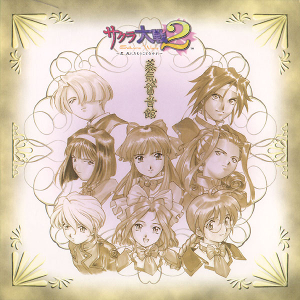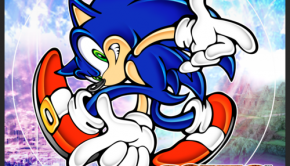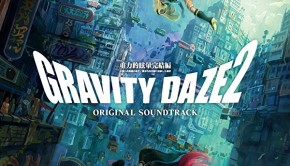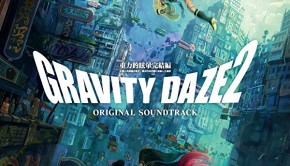Sakura Wars 2 Steam Gramophone
 |
Album Title: Sakura Wars 2 -Prithee Do Not Die- Steam Gramophone |
| Record Label: Marvelous Entertainment |
|
| Catalog No.: MJCA-00027 |
|
| Release Date: June 17, 1998 |
|
| Purchase: Buy Used Copy |
Overview
Sega/Red’s Sakura Taisen, with its unique blend of mechs and girls, steampunk and traditional Japanese elements, became a hit. A sequel was produced, like the first, for the Sega Saturn. All of the elements that made the first popular were brought back, including the cast. The staff reprised their roles, as well, with director/lyricist Ohji Hiroi and composer Kohei Tanaka returning for another round. As before, Tanaka, a veteran anime composer, provided a score that combined elements of pop, classical, and traditional Japanese music. It may be on the light side overall, but when these elements come together, it’s quite a concoction.
Body
In the liner notes for Sakura Taisen 2, Tanaka writes that he wanted to achieve something close to a live sound through the Saturn hardware. Some of the tracks feature live instruments, but the majority are rendered using the internal sound chip, and Tanaka does manage to achieve an impressively realistic sound when he’s aiming for it, far surpassing that of the original game. The Japanese traditional instruments that appear are particularly improved; they sound great and have a good deal of character. Synthesized sounds feature prominently throughout, though, so much of the time he was not trying for strict authenticity, which I feel fits the setting and feel of the game.
The theme song from the first game, “Geki! Teikoku Kagekidan”, returns and it remains an infectious pop song in the J-pop heroic mode. The version here is altered somewhat from the first game’s, and the soundtrack offers three versions, led by the characters Sakura, Sumire, and Maria respectively. There is also an instrumental version on the Saturn internal sound chip. None of these are “full” versions, so each has only a single verse and chorus.
The songs of the Sakura Taisen series have taken on a life of their own. The soundtrack features the instrumental versions of these, each connected with a specific character, and the majority of them are found in a block early on in the first disc. There is a good variety, from the poppy Japanese flavor of Sakura’s theme, “Spring Has Come”, to the dramatic Broadway feel of Maria’s “Alive with Joy”. It’s fairly obvious listening to them that they were written as songs rather than instrumental pieces, but Tanaka’s facility with both styles makes it work in spite of this. The songs themselves were released on a separate disc, as per series tradition.
Much of the rest of the soundtrack makes extensive use of traditional Japanese instruments. These are generally used more for flavor than authenticity, and tracks like “The Imperial Theater – Daytime Theme” combine them with Western instruments and synth pads for a sound that mirrors the relatively light tone of the game far better than a more authentic one would have. All of these elements come together perfectly in “Battle 1”, which gleefully synthesizes Japanese instruments and melodic patterns with brass fanfares and soaring strings more akin to Hollywood than traditional Japan. In other circumstances, this kind of eclectic hodge-podge of styles might seem tasteless or self-parodying, but here it works.
On a more subdued note, the breathy sound of the shakuhachi lends the mysterious but alluring “Demon King’s Theme” an exotic touch, At other times, the music evokes Japanese traditional styles through the harmony and melody, rather than instrumentation, as in the dense chords in “Ominous Theme” or the harp’s koto-like arpeggios in “The Imperial Theater – Nighttime Theme”.
The other major influence on Sakura Taisen’s score is film music, which comes in part out of Tanaka’s wide-ranging experience as an anime composer. The string writing in tracks like “Theme of Anxiety” shows an excellent command of this style and tone, as does its subtle use of a low clarinet trill. Both of the “Mikasa” tracks are marches in the heroic Hollywood mode, although the prominent harp and celesta of the second plant it equally firmly in the realm of VGM. The bass ostinato and chromatic string accompaniment of “Battle 3”, on the other hand, are reminiscent of Sugiyama’s similar themes, although a brief transitional section leading to the repeat, eerily floating on strings and synth, is entirely Tanaka’s own. Sometimes the film influences, although skillfully used, can be overbearing, as in the sentimental “Theme of Love” or “Grand Finale”, both replete with rapid scales in the strings and other stock-in-trade cliches.
The final battle theme once again draws on all of Tanaka’s influences, film music, Broadway, and pop, all brought together with an impressively integrated concertante piano part. His orchestral fluency is apparent throughout, and here as in the earlier “Battle 1”, the stylistic shifts (here partially related to the use of earlier themes) are charming rather than off-putting, making the track an excellent summation of the soundtrack. An instrumental version of the series’ main theme follows, now clad in full orchestral garb. Finally, the game’s ending song, “Blooming Maidens”, appears in an arrangement for music box with synth pad backing.
Summary
With Sakura Taisen 2‘s score, Kouhei Tanaka set out to surpass the original in sound quality, and this is immediately apparant. While it may lack some of the highlights of the first game’s score, it has many of its own. Drawing variously on film score, Broadway songwriting, Japanese traditional sounds, and J-pop, the score has a bit of a scattered feeling to it, but while this motley face may seem off-putting to people who prefer more consistency in their soundtracks, or those who enjoy Tanaka’s “pure” orchestral style, it serves to accentuate the off-beat nature of the game itself. Tanaka’s orchestral writing is assured and his melodies are memorable, but at times the music lapses into sentimentality that may be cloying to some, and there are more good than great tracks scattered throughout the soundtrack’s two discs.
Do you agree with the review and score? Let us know in the comments below!
3.5
Posted on July 5, 2015 by Ben Schweitzer. Last modified on January 19, 2016.














